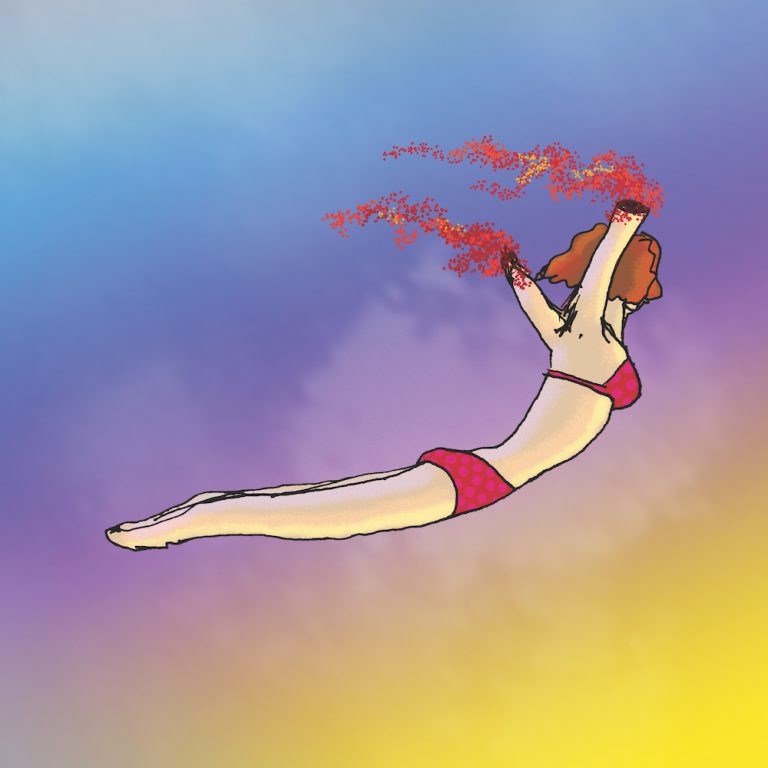The cover art for Blood — the 19th solo album by rock mainstay Juliana Hatfield — is beautifully, and perfectly, unsettling. It’s an innocuous image of a woman floating with a lovely pastel-colored backdrop behind her – only, her hands are cut off and blood trails from the severed limbs. Like the stories of Denis Johnson’s Jesus’ Son or the films by the Coen Brothers, the cover art captures a brutal truth about life. Life is never either/or, funny or sad, good or evil. If anything, life’s extremes oftentimes collide in the most absurd ways. Life, in other words, doesn’t always make sense.
Blood is an undeniably fun album brimming with indie-pop sensibilities and anthemic energy that makes listeners want to sing along. But what lines they’d sing! Lines like “I’m living in a nightmare and I can’t wake up / the whole world is controlled by fascist blood-sucking thugs,” from the bouncy “Nightweary”, where Hatfield delivers these seething lines with blasé acceptance. There’s also lines like “I stuck the knife into your neck / then I pulled it out and I stabbed you again” from “Had A Dream”, a track that evokes Sleigh Bells in its pulsing intensity. The track is nonetheless grounded in Hatfield’s softer delivery of the chorus; here, as on “Nightweary”, the personal meets the political — “It was a very American dream.” It’s this dichotomy that makes Blood an equally intriguing listen: Hatfield never lets listeners off the hook from recognizing the jarring truth portended on the cover.
Hatfield co-produced Blood along with new collaborator Jed Davis. Together, they’ve managed to blend the rock and pop foundations of the album’s 10 songs with overdubs and effects that give them a chip-on-your-shoulder edge that’s vital to their impact (the album was mixed by engineer James Bridges at Q Division Studios in Somerville, MA). Heart-pounding drum-programmed beats run throughout opener “The Shame Of Love”; distorted guitars swirl around the song’s chorus to create particularly dizzying moments, reflecting the urgency of Hatfield’s words (“I head toward the storm / my bad directions”). Yes, at times, the production tips into the overwhelming; the drums and synths on “Chunks” occasionally drown out Hatfield’s voice altogether — even if this were intentional, it distracts from and blunts the track’s impact. Yet, most often, the approach succeeds.
And despite the existential weight Hatfield packs into Blood (at 33 minutes, the album is a quick listen), there’s still time dedicated to quieter, yet no less poignant, moments. She leans into dream pop on album highlight “Splinter”, where gentle guitar strumming and bass plucks beautifully complement Hatfield’s introspection as she contemplates a significant life change (“I’m ready to finally pop this bubble / get myself in some kind of trouble”). “Gorgon” is a lovely indie-pop anthem with a feminist spirit in the vein of early Liz Phair (“I never promised anyone anything / no enchanted fairytales”). The dramatic ballad “Dead Weight”, a song with a distinct 1990s alternative rock vibe, falls in-between the album’s extremes and stands out because of it.
On the single “Mouthful of Blood”, Hatfield bites her tongue down so hard and so consistently, she makes the song’s title a reality. It’s a surprisingly visceral image that’s accompanied by teasing keyboard hooks and one of the album’s most lighthearted vocal melodies. It’s a moment of intense empathy; she’s examining the damage these ills, out of her control, are doing to her, and extending that understanding to others. She understands that people are victims of their circumstances and that free will only goes so far. Life is a bloody foot in a woodchipper against a serene Midwestern snowscape, a man admiring a beautiful hang-gliding woman while he strips an abandoned home for copper. Sure, on paper, these turns of events might seem outlandish, even implausible. Then again, life doesn’t always make sense.

